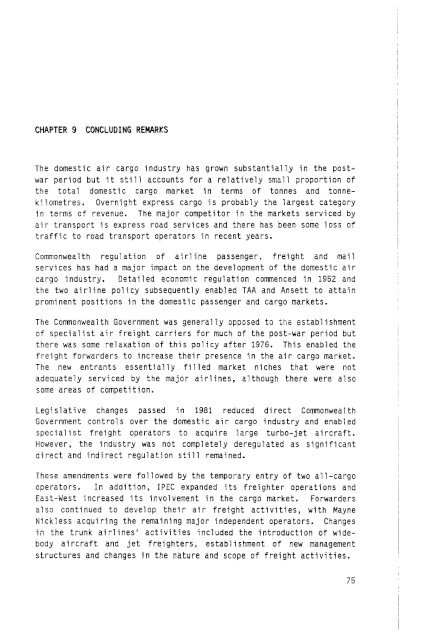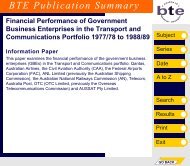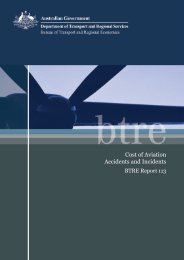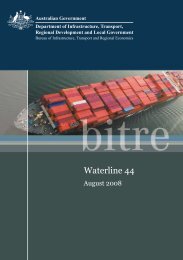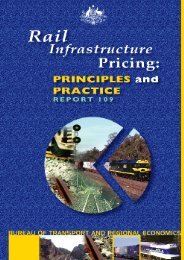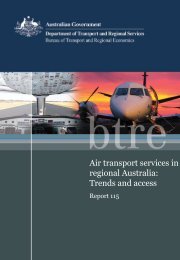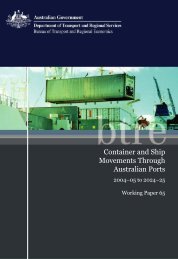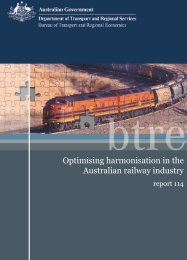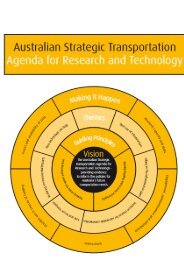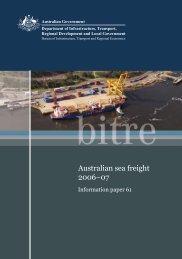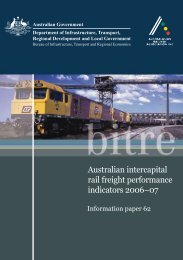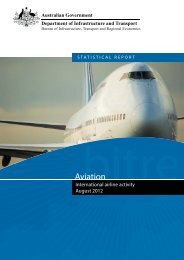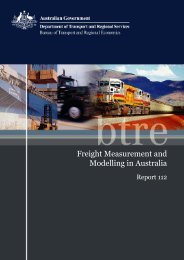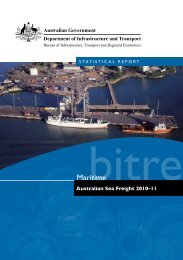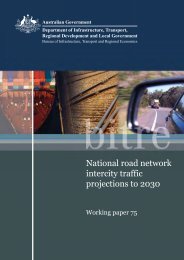Domestic Air Cargo Industry in Australia - Bureau of Infrastructure ...
Domestic Air Cargo Industry in Australia - Bureau of Infrastructure ...
Domestic Air Cargo Industry in Australia - Bureau of Infrastructure ...
Create successful ePaper yourself
Turn your PDF publications into a flip-book with our unique Google optimized e-Paper software.
CHAPTER 9 CONCLUDING REMARKSThe domestic air cargo <strong>in</strong>dustry has grown substantially <strong>in</strong> the postwarperiod but it still accounts for a relatively small proportion <strong>of</strong>the total domestic cargo market <strong>in</strong> terms <strong>of</strong> tonnes and tonnekilometres.Overnight express cargo is probably the largest category<strong>in</strong> terms <strong>of</strong> revenue. The major competitor <strong>in</strong> the markets serviced byair transport is express road services and there has been some loss <strong>of</strong>traffic to road transport operators <strong>in</strong> recent years.Commonwealth regulation <strong>of</strong> airl<strong>in</strong>e passenger, freight and mailservices has had a major impact on the development <strong>of</strong> the domestic aircargo <strong>in</strong>dustry. Detailed economic regulation comenced <strong>in</strong> 1952 andthe two airl<strong>in</strong>e pol icy subsequently enabled TAA and Ansett to atta<strong>in</strong>prom<strong>in</strong>ent positions <strong>in</strong> the domestic passenger and cargo markets.The Cornonwealth Government was generally opposed to the establishment<strong>of</strong> specialist air freight carriers for much <strong>of</strong> the post-war period butthere was some relaxation <strong>of</strong> this policy after 1976. This enabled thefreight forwarders to <strong>in</strong>crease their presence <strong>in</strong> the air cargo market.The new entrants essentially filled market niches that were notadequately serviced by the major airl<strong>in</strong>es, although there were alsosome areas <strong>of</strong> competition.Legislative changes passed <strong>in</strong> 1981 reduced direct Comnonweal thGovernment controls over the domestic air cargo <strong>in</strong>dustry and enabledspecialist freight operators to acquire large turbo-jet aircraft.However, the <strong>in</strong>dustry was not completely deregulated as significantdirect and <strong>in</strong>direct regulation still rema<strong>in</strong>ed.These amendments were followed by the temporary entry <strong>of</strong> two all-cargooperators. In addition, IPEC expanded its freighter operations andEast-West <strong>in</strong>creased its <strong>in</strong>volvement <strong>in</strong> the cargo market. Forwardersa1 so cont<strong>in</strong>ued to develop their air freight activities, with MayneNickless acquir<strong>in</strong>g the rema<strong>in</strong><strong>in</strong>g major <strong>in</strong>dependent operators. Changes<strong>in</strong> the trunk airl<strong>in</strong>es' activities <strong>in</strong>cluded the <strong>in</strong>troduction <strong>of</strong> widebodyaircraft and jet freighters, establishment <strong>of</strong> new managementstructures and changes <strong>in</strong> the nature and scope <strong>of</strong> freight activities.75


